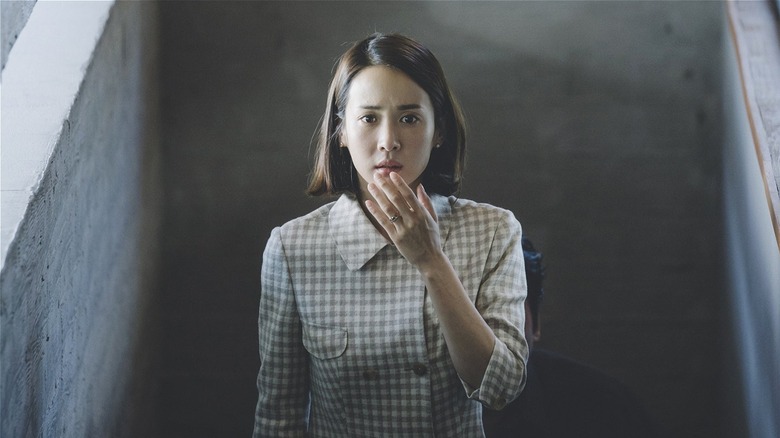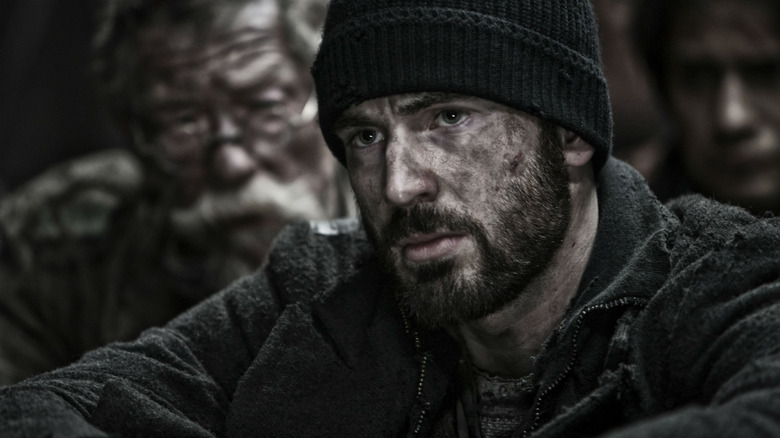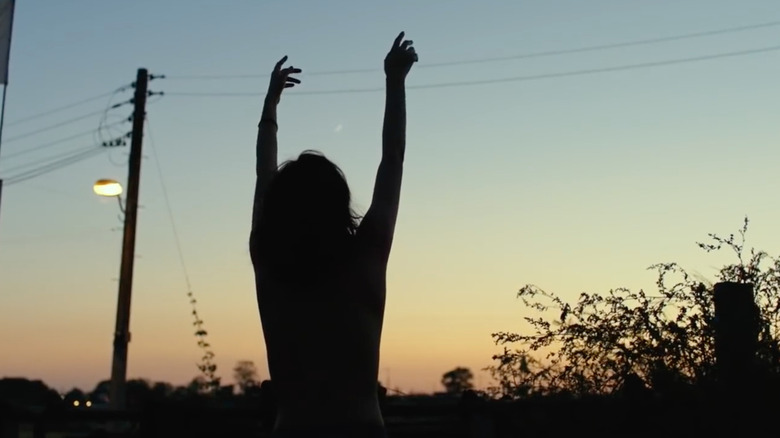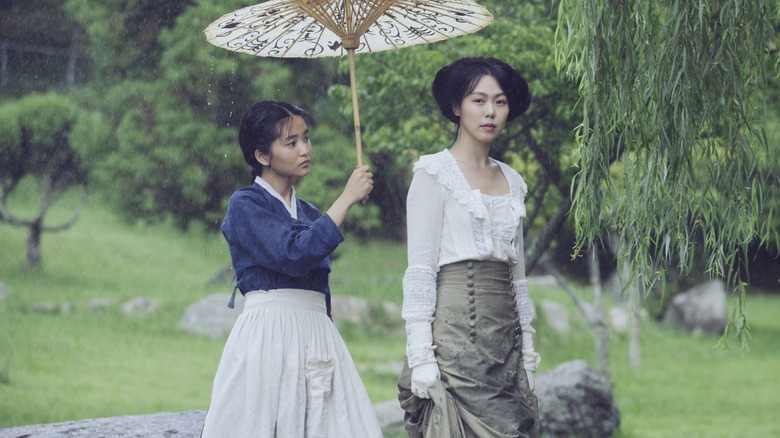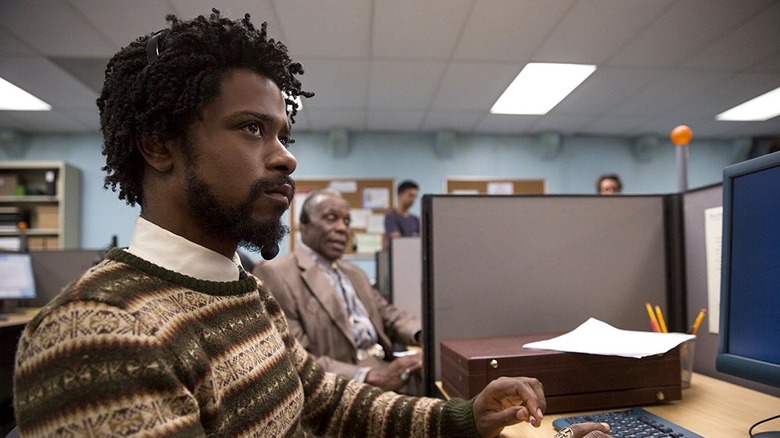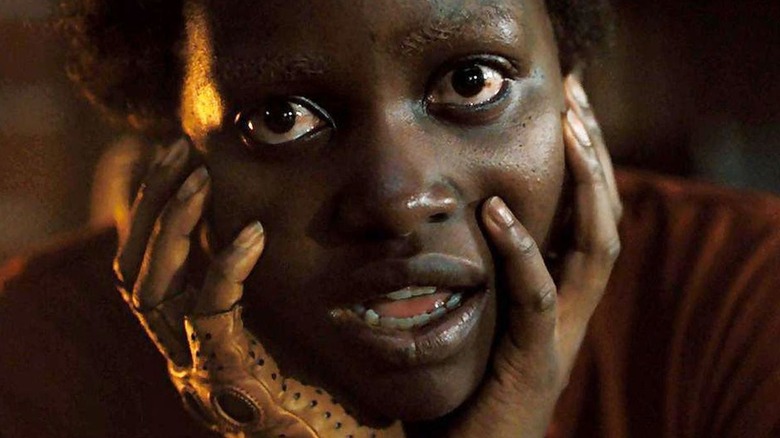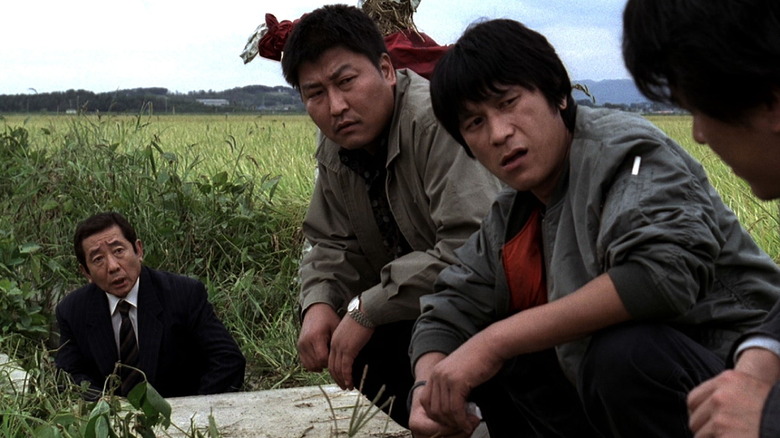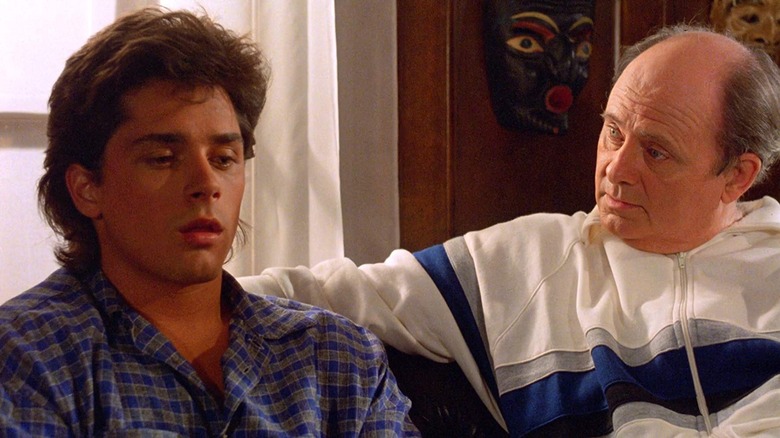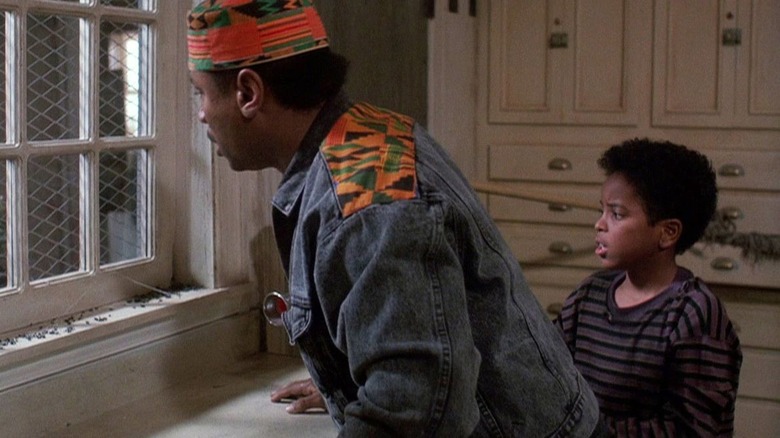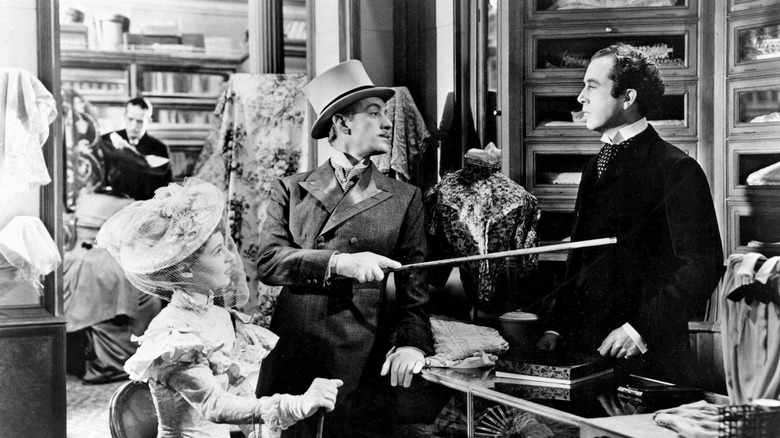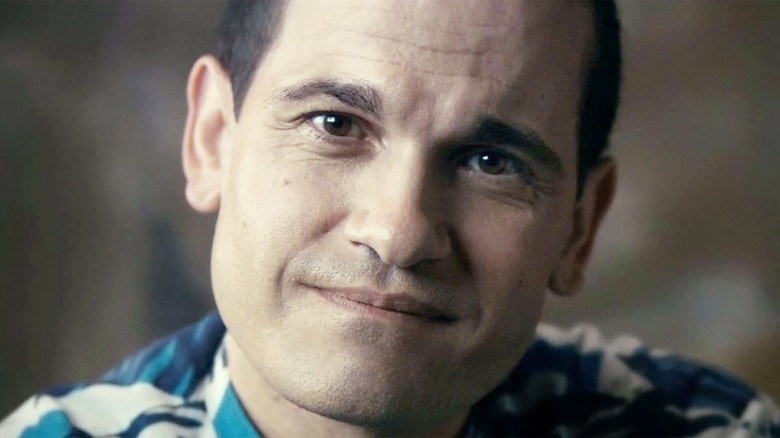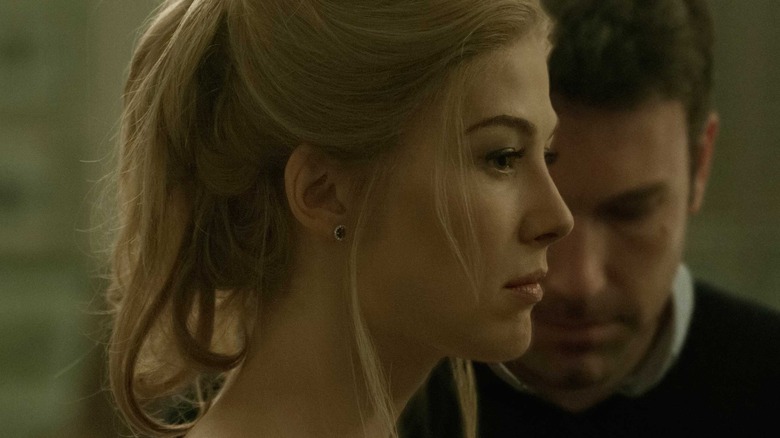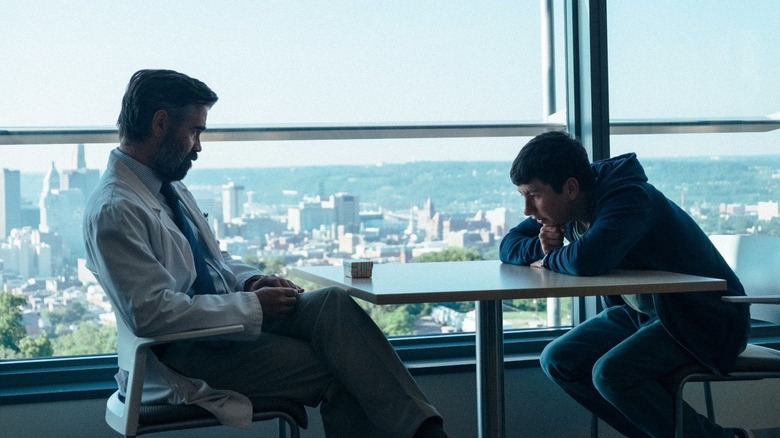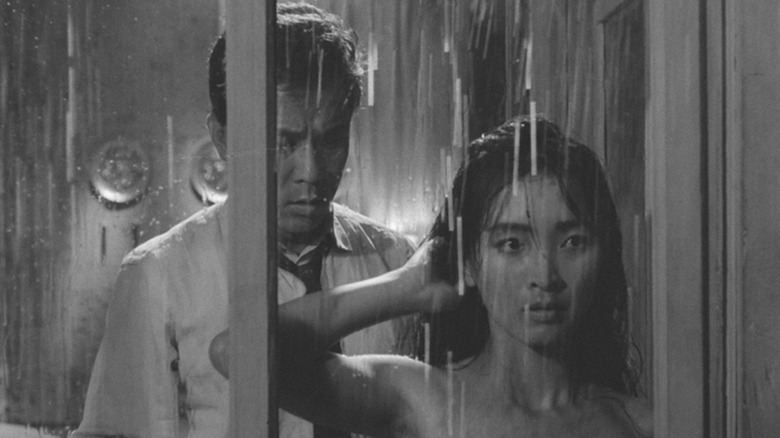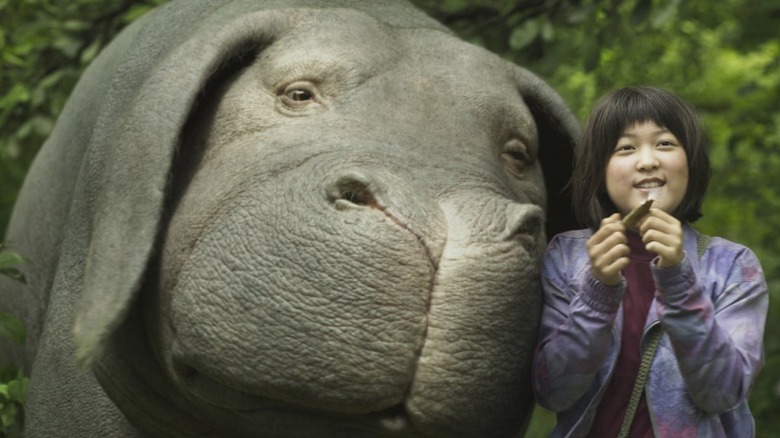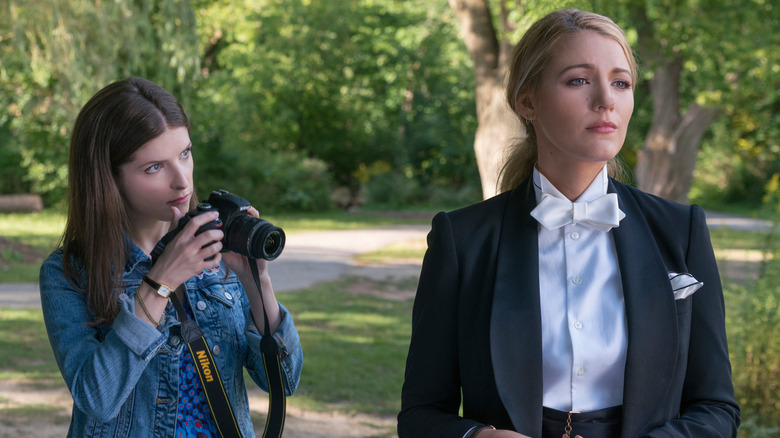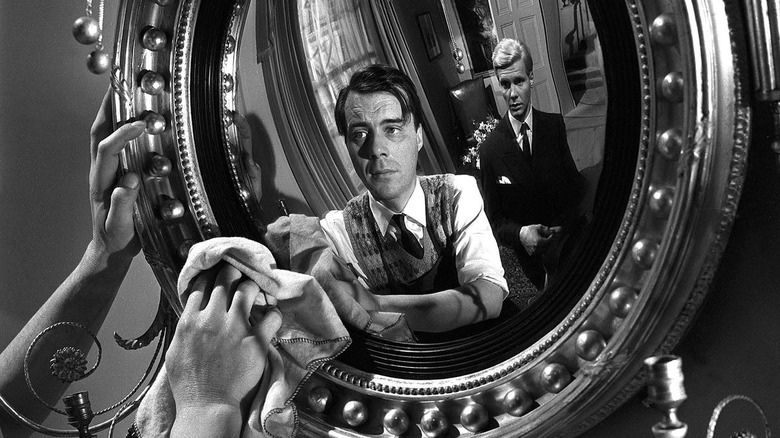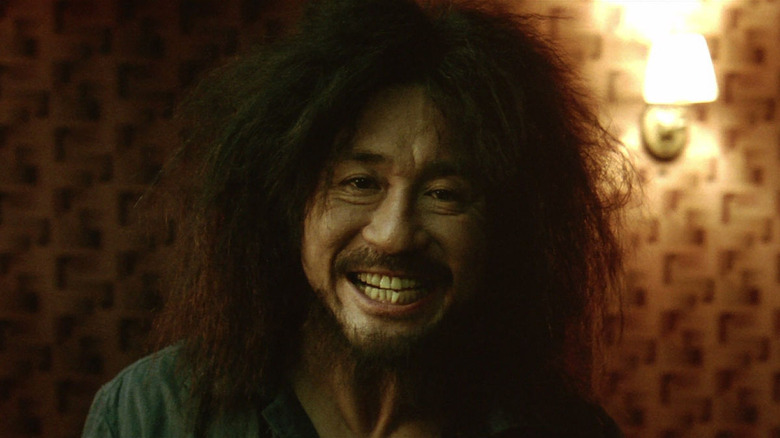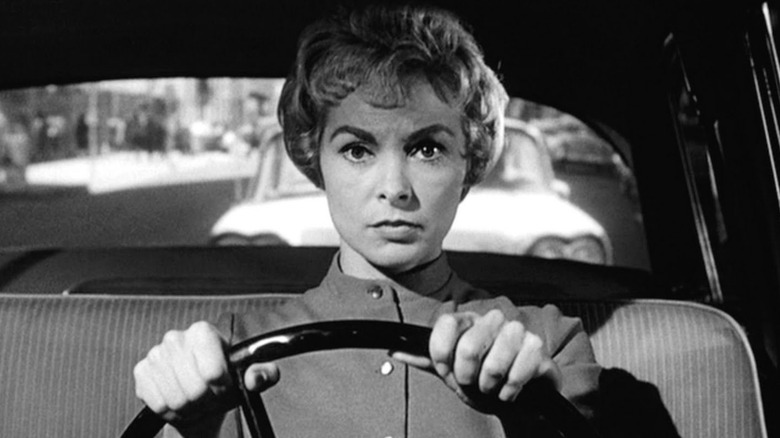20 Great Movies Like Parasite You Should See Next
At the 92nd Academy Awards in February 2020, there was one film that dominated the evening – Bong Joon-ho's genre-bending dark comedy, "Parasite." The film made history, being the first non-English language film to win best picture, as well as picking up statues for best director, best original screenplay, and best international feature film. In 2025, the New York Times surveyed over 500 Hollywood insiders to name the best film of the 21st century — and "Parasite" came out on top.
The Hollywood Reporter called this a "watershed moment for how far a film featuring a non-white, non-English-speaking cast can climb within mainstream Hollywood," and it made wider audiences sit up and take notice — not just of Bong Joon-ho, but the vast landscape of films available.
Bong Joon-ho's films frequently have more to them than first meets the eye, and that is certainly the case with "Parasite." The film focuses on two families: the Kims and the Parks. They're worlds apart in terms of wealth, but their lives begin to overlap when the Kims scheme their way into the Park household, posing as everything from an English tutor to a chauffeur.
If you love "Parasite's" twists and turns, the carefully interwoven class commentary, or you just want to check out some other great South Korean cinema, here are some films like it that you should add to your watchlist.
Snowpiercer
When thinking about films similar to "Parasite," it makes sense to start with the filmography of director Bong Joon-ho himself. His 2013 film "Snowpiercer" is set in a dystopian future, after attempts to halt global warming prompted a new ice age, and the last survivors of humanity — who live on the movie's titular train -– exist in a microcosm of society where the wealthy elite rule, and the poor are marginalized.
While very different in terms of scope, "Snowpiercer" is thematically very similar to "Parasite," focusing on the poorer factions in society as they rebel against the rich. Leading the charge is Curtis Everett (Chris Evans), who mobilizes those at the back of the train in an uprising as they force their way to the front.
The film itself faced its own uphill struggle, as Bong found himself locked in a battle with disgraced producer Harvey Weinstein, who was insisting that 25 minutes be cut from the film. Eventually, the director's original version was released, but at the cost of the film receiving significantly less distribution. Despite this setback, Bong emerged with his film — and more importantly, his integrity — intact. In a profile in Vulture, Bong says of the incident, "maybe for [Weinstein], it was some kind of punishment to a filmmaker who doesn't do what he wants, but for me, we were all very happy."
Burning
As its title suggests, Lee Chang-dong's 2018 film takes a methodical, slow-burn approach, with the flickering embers of the plot singeing your senses until it soon becomes all-encompassing. It's best to go into "Burning" knowing as little as possible, as a key component of the film is its ambiguity, and in questioning what is real or imagined.
Both Lee Chang-dong and Bong Joon-ho are masters of their craft, and while "Burning" and "Parasite" are tonally very different movies, both explore the vast economic divide prevalent in South Korea. In 2019, a survey by the Korea Institute for Health and Social Affairs found that 85% of respondents "felt there were 'very big' income gaps in society and people needed to be from a wealthy family to be successful" (via Reuters).
In "Burning," the characters of Lee Jong-su (Yoo Ah-in) and Ben (Steven Yeun) represent the vast disparity in wealth that particularly affects the youth in Korea. While Jong-su struggles to find employment and make ends meet, Ben lives a comfortable and affluent lifestyle — crucially, never giving away exactly how he has accrued his wealth, which creates a further divide between them.
The Handmaiden
2016's "The Handmaiden" is a sumptuous and deliciously dark erotic thriller from South Korean filmmaker Park Chan-wook that delivers a similar narrative to "Parasite" — the poor trying to usurp the rich by infiltrating a wealthy household. Nam Sook-hee (Kim Tae-ri) is an orphaned pickpocket hired by a con-man who calls himself "Count Fujiwara" (Ha Jung-woo), to work as a maid for the wealthy Japanese heiress Lady Hideko (Kim Min-hee). While working for Lady Hideko, Sook-hee is to persuade her to marry the Count, so they can dupe her out of her inheritance.
As is to be expected in a film from Park Chan-wook, all is not quite as it seems, and the multifaceted plot contains several layers of deception that are gradually peeled back to reveal the truth. While the clearly defined three-chapter structure of "The Handmaiden" is very different from "Parasite," both perfectly utilize this idea of duplicitous characters to carefully manipulate the audience and build intrigue before a perfectly timed reveal.
In addition to thematic similarities in their films, the two compatriot directors share a link that traces back to Bong Joon-ho's studies at the Korean Academy of Film Arts, where his graduation project — a short film called "Incoherence" — was seen by Park Chan-wook. Speaking about the film, Park said, "It was so fresh, off-the-wall, and creative," (via Soompi) and this early endorsement from one of the most well-respected South Korean filmmakers was something that shaped Bong's career going forward.
Ready or Not
The happiest day of newlywed Grace's life quickly turns into a nightmare when the bride (played by Samara Weaving) is forced to participate in a bizarre ritual that sees her wealthy in-laws trying to hunt her down and kill her in a sadistic game of hide-and-seek. Where "Parasite" has brief but shocking moments of violence, "Ready or Not" dials this to 11, delivering a delectably dark satire about the insanity of the filthy rich.
Grace is undoubtedly intimidated by the family's wealth, but longs to be accepted by them, having been a former foster child. When things take a turn for the sinister, it's impossible not to root for Grace, and there's a fiendish pleasure to be found watching these monstrously wealthy characters get their comeuppance.
"Ready or Not" and "Parasite" were both released in 2019, and it wasn't hard to see the overlap between them and some other big releases from that year. In a feature for The Ithacan, writer Elijah de Castro observed these similarities, saying, "in these films, those from the working class or minority groups siege the wealth from the upper class and get their piece of sweet revenge." Bong Joon-ho also spoke about the thread running through a lot of 2019 releases, saying, "It's not as if we all gathered together for a big meeting on how we should talk about class, it just happened very naturally" (via GQ).
Sorry to Bother You
If you thought the climax of "Parasite" was wild, prepare yourself for Boots Riley's insane satirical comedy, "Sorry to Bother You." The film focuses on the appropriately named Cash (Lakeith Stanfield), a young Black man struggling to pay the bills, who starts a new job as a telemarketer. When one of his new co-workers coaches him to use his "white voice," Cash finds he can excel in his career and climb the corporate ladder.
As smarmy CEO Steve Lift, Armie Hammer represents the evil of capitalism, luring Cash in with the promise of wealth and power. Lift is a megalomaniac, pocketing vast profits while his employees on the lowest rungs work hard for meager pay. As Cash becomes more absorbed into this world, things take a very unexpected turn, and there are some particularly arresting images that you won't be able to shake.
"Sorry to Bother You" expertly blends surrealism and fantasy with some very real-world themes, and takes a particularly scathing look at the danger mega-rich CEOs pose when their behavior goes unchecked. First-time director Riley speaks openly about his political beliefs, and in an interview with Time he reflected on the strange places the film goes, saying, "I realized that if I bent the reality of the world that was there, it actually drew attention to that parallel point in our actual reality ... through all the craziness, there's an optimism that comes when you realize there's a way to fight back."
Us
"Us," also released in the same year as "Parasite," was Jordan Peele's follow-up to the wildly successful "Get Out," and tells the chilling story of a family attacked by sinister versions of themselves. Calling themselves "the tethered," the doppelgängers emerge from the shadows with murderous intent, particularly for the Wilson family, led by Adelaide (Lupita Nyong'o).
There's a lot of commonality between "Parasite" and "Us," especially in the sense of "are these people who they say they are?" There is a particular mystery surrounding Adelaide, who experienced a traumatic encounter with her doppelgänger in a house of mirrors when she was a young girl. In "Parasite," the audience is in on the secret in terms of the new identities the Kim family assumes; in "Us," we're on a level playing field with the Wilsons, trying to establish the truth behind the duplicitous doppelgängers.
As you might expect from a Jordan Peele film, "Us" is also rich in social commentary, and the idea of those above and those below, or those with and those without, is given a terrifying twist. Speaking about the film at an audience Q&A, Peele said, "We are in a time where we fear the other, whether it's the mysterious invader who might kill us or take our jobs, or the faction that doesn't live near us that votes differently than we did. Maybe the evil is us. Maybe the monster that we're looking at has our face" (via Vanity Fair).
Memories of Murder
Featuring Bong Joon-ho regular Song Kang-ho — who plays the patriarch of the Kim family in "Parasite" — "Memories of Murder" was Bong's second feature film and the first one that garnered major critical acclaim. Park Doo-man (Song Kang-ho), Cho Yong-koo (Kim Roi-ha), and Seo Tae-yoon (Kim Sang-kyung) are detectives who -– despite their vastly different techniques — must work together to find a serial killer after two women's bodies are found.
Detective Park employs an unorthodox technique when it comes to his work, believing that he can find a suspect just by making eye contact, and his partner Detective Cho is frequently employed as the muscle to torture the suspects. Detective Seo, who transfers from Seoul to assist on the case, is a rung up in terms of professionalism, but all of them are hopelessly out of their depth in this instance, and struggling with the department's ineptitude and lack of resources.
Like "Parasite," this film is taut, surprisingly emotional in places, and also tinged with social satire and dark comedy -– delicately balancing all of these in the way only Bong can. Another surprising link between the two films is peaches, a symbolically lucky fruit in Korea that "protect people from evil influence and [are] a symbol of vitality and immortality" (via Korea Times). Used almost as a weapon in "Parasite," in "Memories of Murder," peaches are employed in a decidedly gruesome manner that might just change the way you see the fruit.
Society
If you like your horror films on the schlocky side, then 1989's "Society" could be the film for you, and is another one that slots nicely into the "rich people are crazy" subgenre of films alongside "Ready or Not" and "The People Under the Stairs." The film focuses on a privileged Beverly Hills teenager, Bill (Billy Warlock), who learns that his family is part of a gruesome cult in which the mega-rich feed off the poor.
In "Parasite," Ki Woo (Choi Woo-shik) frequently remarks on the "metaphorical" nature of certain events — a fun meta aside in a film that is in fact full of metaphors. The idea of "feeding" off of a person wealthier than yourself forms a major part of the plot in Bong Joon-ho's film, and this is an idea explored in "Society" as well — just in a much more literal sense.
"Society" is a surreal, gory, and outrageous body-horror film, with stomach-churning effects from Joji Tani (also known as Screaming Mad George), who previously worked on films such as "Big Trouble in Little China" and "Predator." As well as the grotesque horror, the film is dripping in satire, and offers an extreme and scathing critique of the social elite, culminating in a particularly infamous sequence — known as "the shunting" – that will live in your nightmares forever.
The People Under the Stairs
Fans of "Parasite" will know that in that film, staircases are salient, and based on the title of Wes Craven's underrated 1991 horror flick, "The People Under the Stairs," you can probably guess what they might have in common. In "Parasite," the set design of the Parks' house is very important, with many elaborate staircases, and a particularly significant one that leads below the basement to the place where a dark secret lives.
This is where the films intersect, and "The People Under the Stairs" focuses on a poor Black family at risk of eviction by their wealthy landlords. Taking matters into their own hands, they decide to steal from their landlord's house; however, they end up finding much more than they bargained for. Within the walls and below the house live strange, rabid humans, and the difficulty isn't in breaking into the house, but getting out.
As well as this idea that dark secrets lurk beneath the surface, "The People Under the Stairs" is rich in social commentary in a way that is funny and still relevant. If the memorable moment in "Parasite" when a pair of eyes appear over the basement stairs appeals to you, then you'll love this film, as it really leans into the horror aspect, as well as having a dark comedic edge similar to Bong Joon-ho's film.
Kind Hearts and Coronets
There may be 70 years between "Parasite" and this classic Ealing comedy, but their shared themes of climbing the social ladder are evergreen. Following the death of his mother, Louis D'Ascoyne Mazzini (Dennis Price) is in line to inherit the title of the Duke of Chalfont. However, there are eight people ahead of him, so he decides to dispatch them to claim his birthright.
With legendary character actor Alec Guinness playing no fewer than nine members of the D'Ascoyne family, "Kind Hearts and Coronets" is a witty and astute comedy about the absurdity of the British aristocracy, and the lengths someone would go to in order to take what is (in their mind) rightfully theirs. There is the idea of classism running through "Kind Hearts and Coronets," — Louis finds himself in his predicament in the first place because his mother supposedly married beneath her, choosing to wed an Italian opera singer instead of a member of the aristocracy.
Despite the plot revolving around murder, "Kind Hearts and Coronets" is a riot, and there's a great joy to be had in seeing the D'Ascoyne family members killed off one by one in increasingly outrageous ways. As Louis, Dennis Price is incredibly charming, narrating his exploits with a sense of refined detachment that is simultaneously chilling and hilarious.
The Imposter
The subject of this 2012 documentary seems almost too insane to be true, but it has to be seen to be believed. "The Imposter" explores the story of French man Frédéric Bourdin, who successfully impersonated missing American teenager Nicholas Barclay — even managing to convince officials and Barclay's own family.
The age difference between Bourdin and Barclay was around 7 years, and they looked nothing alike physically. Bourdin was still able to convince the family, however, and even had an elaborate story prepared to explain the difference in eye and hair color. Director Bart Layton probes into the "why" and "how" of this unbelievable story, yet presents it in a way that manages to remain balanced and open to interpretation. Speaking about the film to Huffington Post, Layton said, "What I wanted to do was something I found more interesting and possibly more challenging, which was to present the audience with different and in some ways conflicting versions of the truth."
The tactics employed by Bourdin -– who had impersonated many children previously — were to gain the trust of those he was trying to convince, perhaps playing on their weaknesses, and always acting with the utmost confidence that he was who he said he was. This is something we also see in "Parasite," with the Kim family using the naïveté of Mrs. Park to their advantage to achieve their positions within the household.
Gone Girl
When it comes to twisty, surprising films about deceitful characters, the one that immediately springs to mind is David Fincher's 2014 "Gone Girl," based on the book of the same name by Gillian Flynn. In "Gone Girl," the mysterious disappearance of Amy Dunne (Rosamund Pike) results in all fingers being pointed at her husband Nick (Ben Affleck) as the prime suspect, but all is perhaps not as it seems.
In terms of manipulative characters, Amy Dunne stands above them all, and Rosamund Pike's exceptional performance even earned the film its only Oscar nomination. Like the characters in "Parasite," Amy is an expert deceiver, going to chilling lengths to convince others that she is telling the truth. While some explanation is proffered for Amy's actions, their extremity makes her a much more difficult character to like, whereas it is perhaps easier to accept the actions of the Kim family in "Parasite," as we feel for their plight.
One thing that hangs over "Gone Girl" — and the latter part of "Parasite" — is a sense of dread and ominous darkness that's hard to shake. In the case of "Gone Girl," we are in the hands of Amy's increasingly unreliable and complex narrator, meaning we're never quite sure what we can believe — something that carries through to the divisive ending.
The Killing of a Sacred Deer
A psychological horror exercise from the unique mind of director Yorgos Lanthimos, "The Killing of a Sacred Deer" is a cold, clinical, and undeniably bleak film that leaves you with a deeply uncomfortable feeling. In the film, we meet surgeon Steven (Colin Farrell), who, after finishing an open-heart surgery, encounters enigmatic teenager Martin (Barry Keoghan). When it is uncovered that Martin has a connection to Steven's past, his family starts to fall mysteriously ill, and Steven is faced with the most harrowing "Sophie's Choice" imaginable in order to save them.
The title of "Parasite" is reflective of what the film is about; one of the definitions of the word is "an animal or plant that lives in or on another animal or plant and gets food or protection from it" (via Merriam-Webster). In the film, this manifests in the Kim family, essentially feeding off the wealth of the Park family. Parasites, by definition, can also lead to infection and disease, and in "The Killing of a Sacred Deer," Martin can be seen as the disease, slowly infiltrating and infecting the family, with horrifying consequences.
While the subject matter of "The Killing of a Sacred Deer" is deeply disturbing, Lanthimos laces it with some deliciously dark comedy, as well. They may be very different films in many ways, but there is a fascinating crossover in terms of what horrors could transpire when a parasitic individual gets their hooks in.
The Housemaid
Cited as one of Bong Joon-ho's influences in making "Parasite," the director has spoken openly about his love for this 1960 Korean classic from director Kim Ki-young, and it isn't hard to see the crossover between the two films, despite them being made nearly 60 years apart.
In "The Housemaid," composer Dong-sik Kim (Kim Jin-kyu) and his wife (Ju Jeung-ryu) are working hard to build an upper floor for their simple home. Mrs. Kim is pregnant, and exhausted from working as a tailor as well as doing things around the house, so they hire the housemaid, Myung-sook (Lee Eun-shim), to help them. However, it isn't long before she begins to display strange and erratic behavior, with harrowing and drastic consequences.
"Parasite" and "The Housemaid" certainly have similar narratives, with those hired to assist or serve in the running of the house scheming for their own gain. Perhaps where Bong Joon-ho was most influenced by "The Housemaid" was in the way it uses stairs as an important allegory, with the Kim's renovations to their home representing the desire to climb the social ladder. This is also prevalent in "Parasite," with the clear altitude difference between the two houses reflective of the family's very different social statuses. Speaking about "The Housemaid" for Criterion, Bong Joon-ho praised the film's depiction of female sexuality, and its social commentary, saying, "I think it did a great job of depicting that."
Train to Busan
What may appear on the surface to be a straightforward zombie movie, "Train to Busan" – from South Korean director Yeon Sang-ho — is packed with class warfare and social commentary, and a truly heartening father-daughter relationship between the characters Seok-woo (Gong Yoo) and Soo-an (Su-an Kim).
Divorced from his wife, Seok-woo is wracked with guilt that he can't be the best father to Soo-an, and decides to take her by train to Busan so she can be with her mother. On the way to the station, there are several red flags that something isn't quite right, but they decide to board the train anyway. Of course, it isn't long before all zombie hell breaks loose, and the pair are forced to form fractious alliances with the other passengers, including selfish businessman Yon-suk (Kim Eui-sung) and a homeless man (Choi Gwi-hwa).
Throughout the carnage, the message of "Train to Busan" is never lost, and it expertly examines and critiques South Korean social hierarchy, much like "Parasite." In the character of Yon-suk, we get the representation of corporate greed, and his selfish attitude sees him place a higher value on himself than others. The contrast to this is the kind and selfless working-class couple Sang-hwa (Ma Dong-seok) and Seong-kyeong (Yu-mi Jung). As well as being a highly effective zombie film, "Train To Busan" ultimately succeeds as a fascinating character study in how a diverse group of ages, backgrounds, and statuses reacts to a common threat.
Okja
While some directors may be critical of streaming services, Bong Joon-ho had nothing but praise for Netflix after they gave him "total freedom" (via The Hollywood Reporter) over his 2017 film, "Okja." For a director like Bong, having complete autonomy is like a kid in a candy store being told they can have whatever they want, and "Okja" certainly doesn't hold back in terms of its scathing message about the evils of mega-corporations.
"Okja" effortlessly blends a Ghibli-esque story about a young farm girl's (Seo-hyun Ahn) friendship with her adorable "super pig," with a ruthless and timely message about the environmental impact caused by corporations who care more about money than animal conservation. In his review for The Guardian, film critic Mark Kermode said that the film's message is "exposing the savage teeth of consumerism behind the friendly smile of corporate capitalism."
Despite its clear message, the film doesn't try to force veganism down your throat, but rather prompts questions about what we're consuming. Speaking to The Independent, Bong said, "I don't expect the entire audience to convert to veganism after watching the film... I don't have a problem with meat consumption itself, but I do want my audience to consider, at least once, where the food on their plate comes from." Even though one examines individual wealth and the other explores excessive corporate wealth, both "Parasite" and "Okja" certainly share a common thread, and in both films, Bong never hides his intentions.
A Simple Favor
"Parasite" is one of those films where, just as you think you know what is happening, it pulls the rug out from under you to reveal a twist you never saw coming. So if you love your movies packed full of twists and turns, then you will probably enjoy Paul Feig's "A Simple Favor," which keeps the shocks coming thick and fast right up to the very end.
In "A Simple Favor," we meet Stephanie (Anna Kendrick) and Emily (Blake Lively) — two moms who become unlikely friends when their kids insist on a playdate. The two are worlds apart, and Stephanie is completely enthralled with Emily's lavish lifestyle and carefree attitude. After the pair trade confessions, Emily asks Stephanie for a favor — to pick up and look after her son — and what seems like a straightforward request soon becomes a mystery when Emily suddenly disappears.
Stephanie begins to assimilate herself into Emily's life — an idea explored in the duplicitous characters of "Parasite" — but all is not quite as straightforward as it seems, as the film relentlessly toys with the audience's expectations. Just as you think you have it all figured out, the film barrels toward its insane conclusion – one you'll be scratching your head over for hours afterward.
The Servant
This 1963 classic sits somewhere between "Parasite" and Paul Thomas Anderson's "Phantom Thread," telling the story of foppish aristocrat Tony (James Fox), and the fraught relationship between him and his manservant Barrett (Dirk Bogarde). "The Servant" deftly hops between genres as it explores the delicate balance of power between master and servant, with the lines becoming increasingly blurred as the film progresses.
We see Tony acting like an overgrown child at times, relying on Barrett to do everything for him. Barrett sees the weakness in him, and encourages Tony to take on a maid, Vera (Sarah Miles), who poses as Barrett's sister but is actually his lover. When Barrett persuades Vera to seduce Tony, it drives a wedge between the master of the house and his lover, Susan (Wendy Craig), who is distinctly cold toward the hired help.
There are certainly similarities to the actions of the Kim family in "Parasite" in the way Barrett assimilates Vera into the household. There is also the sense of the shifting power balance between the rich and those hired to help them, with both being locked in a sort of codependency with the other. As well as the biting social commentary, there is a perverse undertone to the film that gives it a dark and surprising edge.
Oldboy
While "Oldboy" is the second installment in Park Chan-wook's thematically connected "Vengeance Trilogy," it also stands alone powerfully, with a stomach-churning reveal that remains as shocking to audiences now as it was in 2003. Like Bong Joon-ho, Park understands the importance of effective storytelling and character development, so that the reveals are perfectly timed to surface at the moment they will leave the most devastation.
"Oldboy" tells the story of Oh Dae-su (Choi Min-sik), who, after being imprisoned for 15 years, embarks on a revenge mission, trying to find his daughter and the identity of the person who held him captive. Along the way, he becomes entangled with beautiful sushi chef, Mi-do (Kang Hye-jung). The film is a brutal and brilliant neo-noir thriller, and features possibly the greatest one-shot action sequence of all time, as Dae-su fights his way through a hallway filled with enemies, armed only with a hammer.
"Parasite" certainly has more moments of levity than "Oldboy" does, but what they both do so expertly is ensure that the characters resonate emotionally with viewers, meaning things hit us that much harder. Both of the films end on an undeniably bleak note, with a sense of ambiguity and quiet horror that sears itself into your brain as the credits roll.
Psycho
Bong Joon-ho is very open about his love for this film, and according to an interview with The Guardian, "he claims to have watched Hitchcock's 'Psycho' at least 50 times." It seems only fitting that "Parasite" would showcase some inspiration from this classic horror, and both of them feature houses that hold dark secrets in their basements.
In "Psycho," we meet Marion Crane (Janet Leigh), who impulsively steals a large amount of money and goes on the run. Stopping to spend the night at the Bates Motel, she meets friendly but odd proprietor Norman Bates (Anthony Perkins), blissfully unaware that she won't make it out alive.
Everyone knows the shower scene in "Psycho," but another important element is the Bates house. Much like the Kims' residence in "Parasite," the Bates house is a character in itself, with a particularly striking staircase at its center. In an interview with Vanity Fair, Bong spoke about the influence "Psycho" had on him, saying, "[Hitchcock] always gives me very strange inspiration. I rewatched 'Psycho' because the Bates house, not the motel, it had a very interesting structure." Inspired by his love of films like "Psycho," Bong even made the decision to re-release "Parasite" in black and white, telling The Hollywood Reporter, "When I think of the classics, they're all in black and white. So I had this idea that if I turned my films into black and white then they'd become classics."
